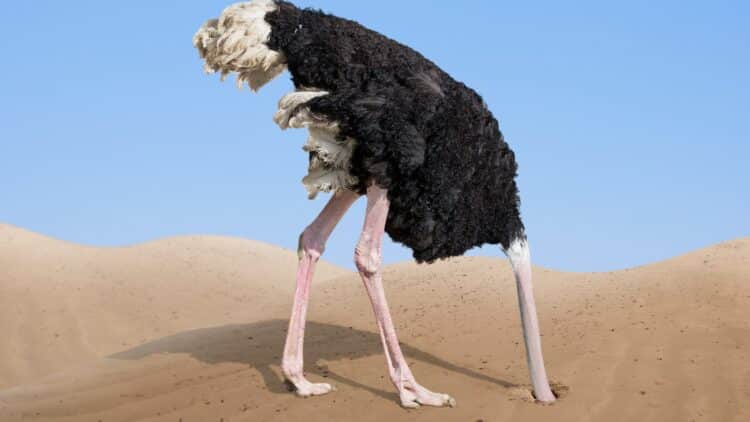Have you ever avoided stepping on the scale so you wouldn’t find out how much weight you gained after Christmas? Have you avoided opening a bank statement for fear of seeing how much money you have left in your account? Have you put off making a follow-up appointment with your doctor? Congratulations, you didn’t realize it, but you were falling into the “ostrich effect.”
There are very few names in the world of psychology as illustrative as the “ostrich effect”: it is a cognitive bias that actively avoids any negative or uncomfortable information, even if it is useful to the person.
Like the famous myth that ostriches bury their heads in the sand, people prefer to live in ignorance and uncertainty rather than face bad news. Almost everyone you know (including yourself) falls into this type of cognitive bias. The question asked at the University of Chicago is another: when do we start doing this? Dr. Radhika Santhanagopalan has delved deeper into the subject and discovered something you might not expect: it starts when we are still in elementary school.
Understanding Adult Ostrich Syndrome
This bias is an information paradox. Unlike economic theory, in which many Austrian liberals—such as Hayek—believe that information is always valuable, the psychological reality of ordinary humans is that we avoid acquiring knowledge in order to spare ourselves emotional pain. We avoid stepping on the scale so we don’t have to face the reality that we are overweight; we avoid looking at our bank account so we don’t have to face the reality that we don’t have as much money saved as we would like; we avoid going to the doctor for a checkup in case we might be sick.
Although we live in a society that promotes self-care as the ultimate goal, the truth is that the ostrich effect is nothing more than “long-term comfort” at the expense of long-term benefit. By creating a weak society in which we ignore pain, we have skyrocketing rates of obesity, living paycheck to paycheck, and low health ratings.
From Questioner to Avoider
Dr. Radhika Santhanagopalan asked herself the following question: “Why are children super curious, but adults become information avoiders?” The study published in Psychological Science reveals the critical transition. Five- and six-year-olds actively seek information.
By the time they are 7 to 10 years old, they are much more likely to strategically avoid any information that provokes a negative emotion. In the study, older children did not want to know why their favorite candy was bad for them, but they did agree to learn why their least favorite brand of candy was unhealthy. In this way, and completely unconsciously, they managed to protect their preferences and self-interest and avoid negative emotions.
The doctor in charge of the study says that there may be an exception with a “growth mindset.” Telling children at school that if they work hard, they can change the outcome encourages them to seek information to improve themselves.
Moral Wiggle Room
Human beings are always in internal conflict: we naturally want to act in our own interests, but we also care about appearing fair. If we deliberately ignore the difficulties of someone else, we can go about our business without feeling guilty. This was demonstrated in the sticker experiment. In one scenario, two children chose two buckets: each had a number of stickers, but they did not know how many their partner had received.
The older children deliberately avoided finding out how many stickers their partner had. This ignorance allowed them to choose the selfish option without feeling guilty, as they maintained the illusion that they were not being unfair.
What if you are already an adult and want to combat your own ostrich effect? Congratulations, the first step is to admit that you may fall into this cognitive bias. The best thing is to avoid chronic avoidance: don’t let yourself be politically polarized, and don’t blindly open yourself up to any ideology. Even if you disagree, make an effort to listen to media outlets and speeches by politicians with whom you don’t entirely agree. It is essential not to lock yourself in an echo chamber where you only hear what you want to hear.

